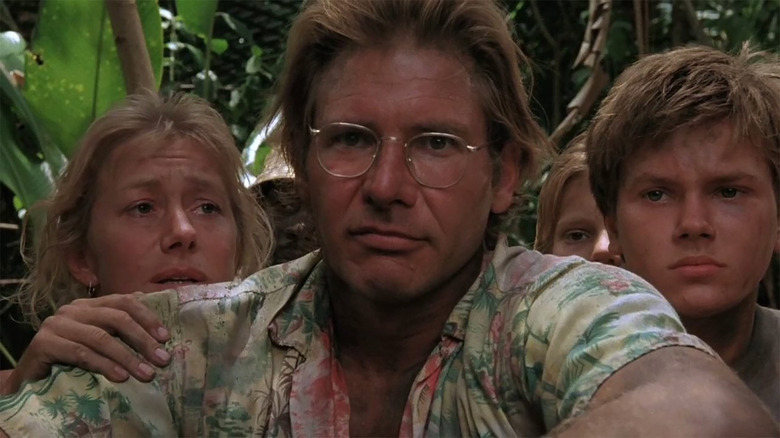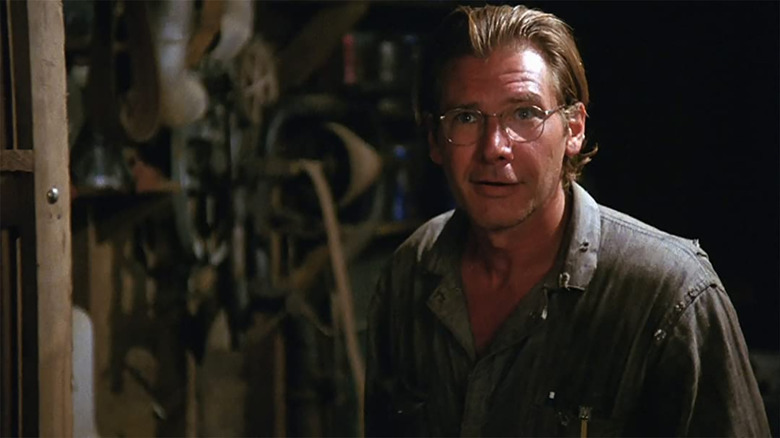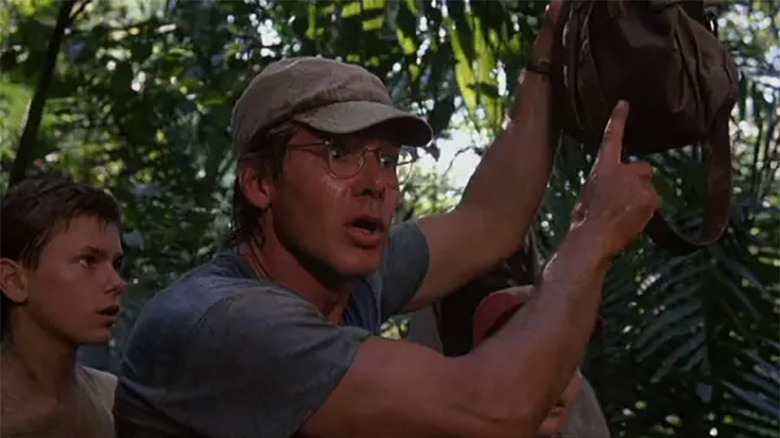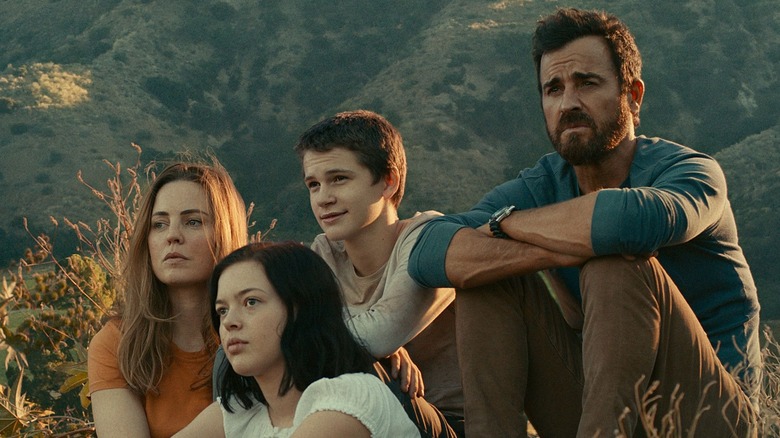Harrison Ford Insisted On Adding A Key Scene To The Mosquito Coast's Screenplay
Harrison Ford has never come across as an actor who was willing to spout off about politics, take up a certain humanitarian cause, or rail against the overseas meddling of the United States. Ford only uses his power of celebrity when it's insisted upon by the Hollywood studio system, reluctantly making the rounds during a seemingly endless press tour to promote his next blockbuster. He certainly never cared about the rise of the Rebellion in "Star Wars" or becoming an international diplomat as Indiana Jones. Shouting, "That belongs in a museum!" in the thrilling opening sequence of "Indiana Jones and the Last Crusade" is about as pedantic as the famed archaeologist ever got.
However, with his Golden Globe nominated role as Alfie Fox in 1986's "The Mosquito Coast," Ford delivered his most politically-minded role by portraying a discontented family man that had grown tired of the deconstruction of American values. Reuniting with director Peter Weir (who had helped secure Ford's first Oscar nomination for "Witness"), Ford was able to play an eccentric character that rants and raves about the material distractions and shallow desires of Americans who don't take the time to look around and realize that the U.S. had become a toilet.
During a meeting with journalists from the Hollywood Foreign Press Association in 1986, Ford delivered a surprising, passionate interview about how you can love America and still criticize it. Suddenly, the megastar performer was being political. The character of Allie Fox loves America so much that he leaves it, forcing his family to come along with him on an ill-fated adventure in the Caribbean jungle. At the time, Ford was campaigning for the Golden Globe Awards and talked about his insistence on adding one crucial scene in "The Mosquito Coast" that proved the character still loved his home country.
What was the scene that Ford wanted in?
The screenplay for "The Mosquito Coast" by Paul Schrader ("Taxi Driver") remained true to author Paul Theroux's 1981 novel of the same name, staying mostly faithful to the original spirit of the book. Ford was well aware that he was using his star power to inject some likability into the misguided idealism of Alfie Fox. Knowing that Peter Weir's film was going to be controversial, Ford wanted to incorporate another story about family from the book that wasn't originally included in Schrader's script. Speaking to the HFPA:
"Peter and I were both aware of the possible difficulty of the audience's understanding what our attitude was about America, so in the original screenplay by Paul Schrader, there was no scene where Allie Fox tells the story of his mother's death. It was one of my suggestions that we included that dramatic story from the book to show the audience that Allie Fox does love America."
In the pivotal scene, Fox compares his dying mother to America herself. He remembers her asking for some rat poison to end her suffering. Loving the country just as much as his own mother, he turns his back on both because he can't bear to see them perish. Helen Mirren's "Mother" character willingly and obediently follows her husband into the brink, a show of blinding loyalty that Ford also addressed with a surprising amount of political and social acumen. "In this particular case, it's not a disproof of feminist theory that this woman reacts as she does to this man. She clearly loves him, and that's their relationship."
A story about fathers
Helen Mirren and Harrison Ford are set to reunite as husband and wife for Taylor Sheridan's Yellowstone prequel "1932," their first time working together since "The Mosquito Coast." The saga of the Dutton family ranch in "Yellowstone" is all about family, but the intimate American story in Weir's divisive film is really all about the responsibility of fatherhood.
Before writing the novel, Theroux befriended an American writer named Moritz Thomsen in Ecuador who regaled the author with horror stories about his abusive father. "His stories about his father were terrifying," Theroux told The Ringer's Tim Greiving. "I started thinking about fathers. I thought about Jim Jones, Huck Finn's father, my father ... even I as a father."
Taking inspiration from "The Adventures of Huckleberry Finn," Theroux made the 14-year-old boy the narrator, so readers could see the rantings of Allie Fox through his son's eyes. Theroux also took real-life influences into account, using the Jonestown Massacre in the 1970's and the fatherly cult leader Jim Jones as a kind of prototype. Jones, too, was a father figure that was strictly anti-government, becoming an expatriate that also attempted his warped version of a utopian community.
Becoming so enamored with a romanticized version of the so-called American dream, Fox forces his family to choose between him and any semblance of a stable, sustainable family life. The family believes in him as an apotheosized father figure, which ultimately causes them to realize that he has betrayed them and left them with nothing but an unattainable ideal.
This is America
Patriotism was at an all-time high during the booming years of the Reagan era when "The Mosquito Coast" came out in theaters, and Ford uncharacteristically spoke about the difference between the two America's that were emerging in the mid-'80s. He told the HFPCA:
"If you have a newspaper handy, I can point out to you, from Ivan Boesky to the secret war in the White House and all the way down the line, that it's our right and responsibility to criticize America. But also, it's a matter of degree. This is a character who's operatic in tone and so his criticisms are as exaggerated, overblown, but we all would hope for a more perfected America, which is not Ronald Reagan's America."
That's about as political as Ford has ever been in the public square, before or since. Theroux's own nephew, writer and actor Justin Theroux (seen above, right), currently stars in the modern day version of "Mosquito Coast" on Apple TV+ that continues the story of a radical antihero for a new generation. The streaming series is facing the same problem that the original did in a way, forcing an America that's arguably more divided and distracted than ever to take a break from their screen life to look at the uncertain world around them.
"There's a great independence of spirit in the American people and some will see Allie Fox as a fool while others will see him as a sympathetic person," Ford acknowledged back in 1986. "I expected that, I never wanted anybody to be comfortable with him. I was not expecting this character to be embraced as a prophet for the new America." Ford's words back then still resonate today, maybe even more so. And maybe today, we need the maverick spirit of Allie Fox more than ever.



